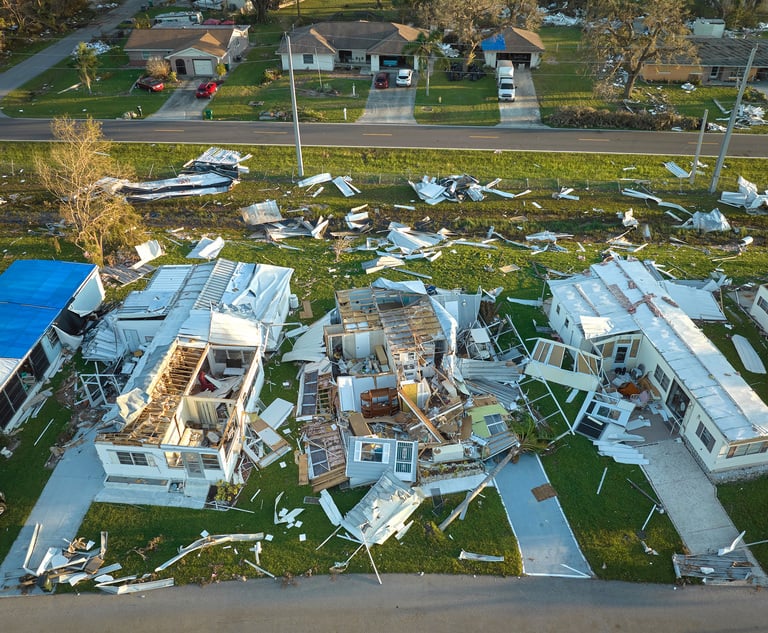It’s official: the Atlantic hurricane season is here. It’s thattime of year again to reconsider the pitfalls of not being ready toweather a serious storm.
|Related: After Hurricane Matthew: Here are 6 tips on how toget ready for the next one
|There are many markets that have not experienced a majorhurricane in several years; South Florida has been spared sinceHurricane Wilma in 2005. In areas that have experienced this lull,we are seeing consumers and businesses taking an increasingly laxapproach to preparedness and protection. While the NationalHurricane Center predicted a below-average Atlantic hurricaneseason, they still expect between three to six hurricanes thisyear, with two or three being major.
|Related: FEMA overpaid $177M for hurricanes in Florida over10 years ago
|Are customers properly insured?
One of the most important planning factors for customers toconsider is to make sure they properly insure valuables. However,people and businesses need to begin planning now to prepare for anypotential aftermath and minimize damages, and not wait until thereis an impending national disaster — a mistake that is commonlymade.
Here are some smart tips to help people and businesses takehurricane season by storm by being properly prepared.
|Related: 4 tips to protect property from hurricanes[infographic]
||
(Photo: Shutterstock)
|Review coverage
It is important to read an updated copy of one’s insurancepolicy. This simple to-do can often be overlooked, but it’simperative to ensure that the insurance covers structural losscaused by natural disasters. Remind customers that flooding damagesare not covered by standard policies and need to be added on forthose living in an area that is more prone to flooding.
|Related: 8 ways to prepare your insureds for adisaster
||
(Photo: Shutterstock)
|Budget funds for deductibles
Customers should ensure they have funds budgeted to pay policydeductibles and post-catastrophe renewal premium increases. Ifrequently encounter businesses and families that budget less andless each year that goes by without a hurricane. Once the stormoccurs, people are caught off guard by the spikes in insurancepremiums. I advise all my clients to take reasonable precaution forthese unpredictable scenarios that could result in significantfinancial burden post-storm.
|Related: 6 steps to maximize business insurance recoveriesbefore the next weather event
||
(Photo: Shutterstock)
|Increase coverage — when possible
Advise clients not to miss the small window of opportunity toincrease insurance coverage before a hurricane hits. It is commonpractice for individuals and businesses to wait until there is amajor hurricane threatening their assets to request a coverageincrease. What many do not know is that the window to do so issmall; When storms get within a certain distance from the coast,insurance companies shut down “binding capabilities,” during whichtime changes to an existing policy can no longer be made nor can anew policy be purchased.
|Related: 6 tips for staying connected this severe weather& hurricane season
||
(Photo: Shutterstock)
|Safeguard possessions
Advise customers to ensure that all key property and familyinformation (insurance policies, financial records, identificationdetails, home inventory, etc.) are stored in a safe and easy toaccess location. These essentials could be gone in a matter ofseconds due to flooding. A waterproof safe is an ideal location tostore documents.
|The number one take-away is to effectively plan by casting afinancial safety net through the proper insurance coverage. Not allplans are created equal. Consumers need to be educated on theiroptions in advance of any natural disaster and every policy shouldbe tailored to the needs of each individual or business.
|Related: Hurricane storm surge puts 6.9 million homes atrisk costing $1.5 trillion to rebuild
|Douglas Jones is co-founder and managing partner of JAG Insurance Group.Jones started his career in 2005 when he joined his father’s firm,today having more than a decade of industry expertise. He earned aBachelor of Science degree from Florida International Universityand holds a 220 General Lines license and Surplus Lines Brokerslicense in Florida. He can be reached at [email protected].
Want to continue reading?
Become a Free PropertyCasualty360 Digital Reader
Your access to unlimited PropertyCasualty360 content isn’t changing.
Once you are an ALM digital member, you’ll receive:
- All PropertyCasualty360.com news coverage, best practices, and in-depth analysis.
- Educational webcasts, resources from industry leaders, and informative newsletters.
- Other award-winning websites including BenefitsPRO.com and ThinkAdvisor.com.
Already have an account? Sign In
© 2024 ALM Global, LLC, All Rights Reserved. Request academic re-use from www.copyright.com. All other uses, submit a request to [email protected]. For more information visit Asset & Logo Licensing.








